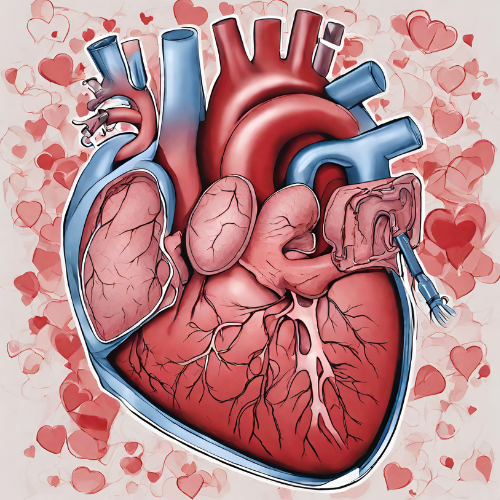Confronting Congestive Heart Failure (CHF): A Comprehensive Guide to Cardiac Health
What is Congestive Heart Failure (CHF)? Congestive Heart Failure (CHF) is a chronic medical condition characterized by the heart’s inability to pump blood effectively, leading to fluid buildup (congestion) in the lungs and other parts of the body. CHF is a serious condition that requires ongoing management and lifestyle modifications to improve symptoms and prevent complications.
Types of CHF: CHF can be classified based on the heart’s pumping ability and the side of the heart affected:
- Systolic Heart Failure: Also known as heart failure with reduced ejection fraction (HFrEF), this type occurs when the heart’s left ventricle fails to pump blood effectively during contraction.
- Diastolic Heart Failure: Also called heart failure with preserved ejection fraction (HFpEF), this type occurs when the heart’s left ventricle becomes stiff and cannot relax properly, impairing its ability to fill with blood.
Symptoms of CHF: Common symptoms of congestive heart failure include:
- Shortness of breath, especially during physical activity or when lying flat.
- Fatigue and weakness.
- Swelling in the legs, ankles, feet, or abdomen (edema).
- Rapid or irregular heartbeat (palpitations).
- Persistent cough or wheezing.
- Difficulty concentrating or confusion.
- Sudden weight gain due to fluid retention.
Causes of CHF: Congestive heart failure can develop as a result of various underlying conditions or risk factors, including:
- Coronary artery disease (CAD) or myocardial infarction (heart attack).
- Hypertension (high blood pressure).
- Cardiomyopathy (disease of the heart muscle).
- Valvular heart disease (malfunctioning heart valves).
- Diabetes.
- Obesity.
- Smoking.
- Excessive alcohol consumption.
Risk Factors for CHF: Several factors may increase the risk of developing congestive heart failure, including:
- Age: Risk increases with advancing age, particularly in individuals over 65 years old.
- History of heart attack or other heart conditions.
- Hypertension.
- Diabetes.
- Obesity.
- Smoking.
- Family history of heart disease.
Diagnosis of CHF: Diagnosis of congestive heart failure typically involves a combination of medical history, physical examination, and diagnostic tests, including:
- Echocardiogram: A non-invasive test that uses sound waves to create images of the heart and assess its structure and function.
- Electrocardiogram (ECG or EKG): A test that records the heart’s electrical activity and can detect abnormal rhythms or signs of heart damage.
- Blood tests: To measure levels of certain substances in the blood, such as B-type natriuretic peptide (BNP), which can indicate heart failure.
- Chest X-ray: To evaluate the size and shape of the heart and detect signs of fluid buildup in the lungs.
Pharmacokinetics and Pharmacodynamics: Pharmacological treatment for congestive heart failure aims to improve symptoms, reduce fluid retention, and optimize heart function. These medications may vary in their absorption, distribution, metabolism, and excretion, as well as their mechanisms of action within the body.
Pharmacological Treatment:
- Angiotensin-Converting Enzyme (ACE) Inhibitors: Drugs such as lisinopril or enalapril help relax blood vessels, lower blood pressure, and improve heart function.
- Beta-Blockers: Medications like metoprolol or carvedilol reduce the heart rate, decrease blood pressure, and improve heart function.
- Diuretics: Drugs such as furosemide or spironolactone help remove excess fluid from the body, reducing symptoms of fluid retention.
- Angiotensin II Receptor Blockers (ARBs): Similar to ACE inhibitors, ARBs like losartan or valsartan help relax blood vessels and lower blood pressure.
Non-Pharmacological Treatment:
- Lifestyle modifications: Adopting a heart-healthy lifestyle, including regular exercise, a balanced diet low in sodium and saturated fats, weight management, smoking cessation, and limiting alcohol consumption.
- Cardiac rehabilitation: A structured program that includes exercise training, education, and support to improve heart health and reduce symptoms.
- Device therapy: In some cases, devices such as implantable cardioverter-defibrillators (ICDs) or cardiac resynchronization therapy (CRT) devices may be recommended to improve heart function and reduce symptoms.
Conclusion: Congestive heart failure is a chronic condition that requires ongoing management and lifestyle modifications to improve symptoms and prevent complications. By raising awareness about the risk factors, symptoms, and treatment options for CHF, individuals can take proactive steps to protect their heart health and enhance their quality of life. Early diagnosis, comprehensive treatment, and adherence to medical recommendations are essential for effectively managing congestive heart failure and promoting long-term well-being. With proper care and support, individuals with CHF can live fulfilling lives and enjoy meaningful activities with their loved ones.




